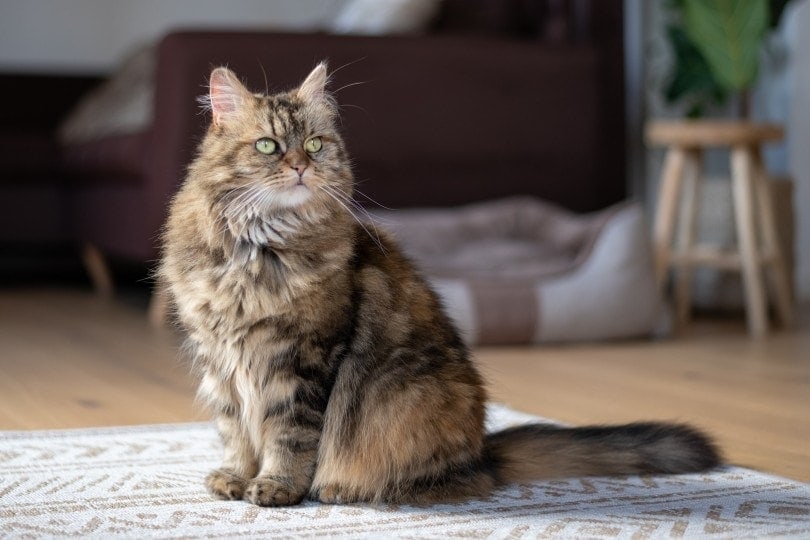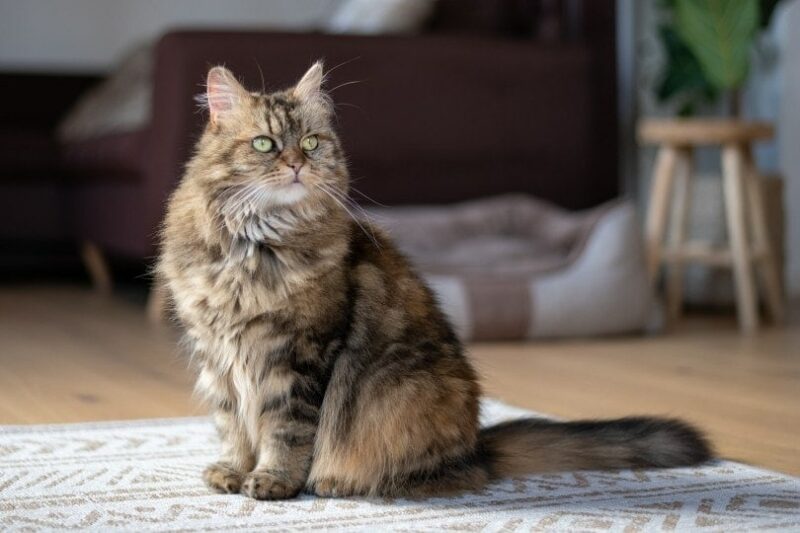One of the most magnificent domestic cats is the Maine Coon, primarily because of their stunning large bodies and fluffy coat. These cats are incredibly affectionate, calm, and friendly, which is why they are one of the most popular cat breeds. These cats grow slowly but steadily, with males reaching up to 25 pounds. The females are smaller than males, weighing 10 to 15 pounds. Maine Coon cats tend to be around 40 inches long, with a height of up to 16 inches. Their bodies are muscular, so feeding them a well-balanced diet with plenty of nutrients and ensuring enough exercise will be vital for their growth.
Continue reading more below to find our helpful Maine Coon growth chart and an explanation of how to keep your cat healthy.
Click to skip ahead:
- Maine Coon Breed Overview
- Size and Growth Chart
- When Will Maine Coon Stop Growing?
- How to Measure Your Maine Coon
- Factors Affecting the Size
- Ideal Diet

Maine Coon Breed Overview
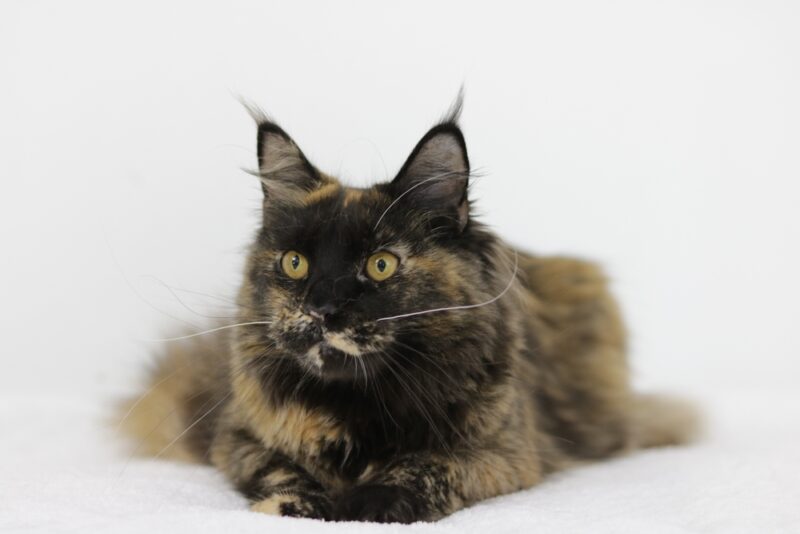
The Maine Coon is a giant cat breed well known for their large body size and adorable fluffy appearance. The breed is prone to polydactylism—a condition that causes them to have an extra toe. The Maine Coon is a popular choice among cat lovers because of its unique appearance and affectionate and sweet nature.
The Maine Coon breed originates from Maine in the US. The “Coon” part of their name comes from the cat’s tail’s unique resemblance to a bushy raccoon tail. These cats are very popular as pets today, although they almost went extinct during the 1950s. Today, they are an adorable breed with a very friendly and pleasant nature. They are intelligent, making them easy to train, and are known for their unique vocalizations.

Maine Coon Size and Growth Chart
A male Maine Coon adult cat weighs between 15 and 25 pounds, while females range between 10 and 15 pounds. Let’s take a look at the growth of Maine Coons from birth until adulthood.
| Age | Female Weight (pounds) | Male Weight (pounds) |
| 1 week | 0.3–0.6 lbs | 0.4–0.6 lbs |
| 2 weeks | 0.6–0.9 lbs | 0.6–0.9 lbs |
| 3 weeks | 0.9–1.2 lbs | 0.9–1.3 lbs |
| 1 month | 1.2–1.6 lbs | 1.3–1.8 lbs |
| 2 months | 2.2–3 lbs | 2.4–3.5 lbs |
| 3 months | 3.3–5 lbs | 3.7–5.2 lbs |
| 4 months | 5.5–7.7 lbs | 6.4–8.3 lbs |
| 5 months | 6–9.2 lbs | 7.2–12 lbs |
| 6 months | 6.83–9.47 lbs | 7.5–13.2 lbs |
| 1 year | 10–15 lbs | 13–20 lbs |
| 4 years | 10–15 lbs | 15–25 lbs |
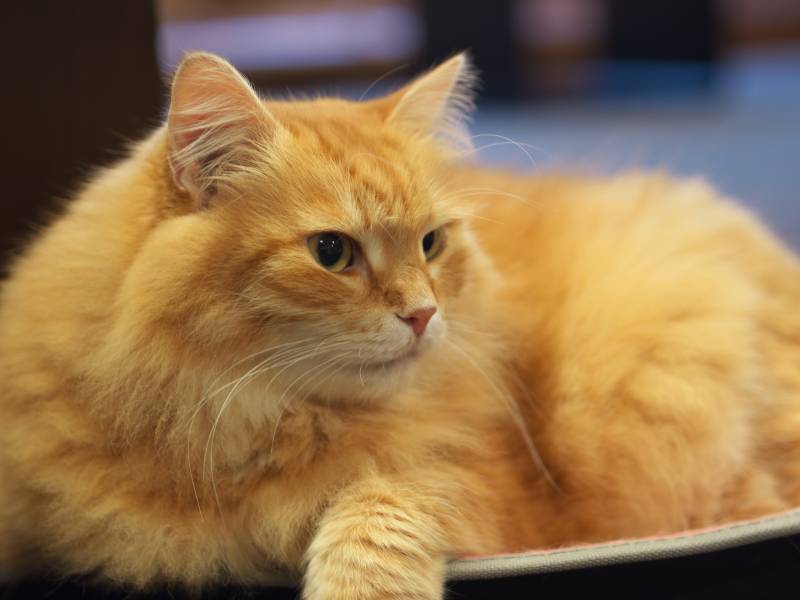
When Does a Maine Coon Stop Growing?
The Maine Coon cat is famous for its large and elegant body, but Maine Coons are actually slow-growing cats that reach maturity around 1 year although some will continue growing until they are 4 years old.
How to Measure Your Maine Coon
Let’s look at how to measure your Maine Coon cat correctly as it’s helpful to keep your own growth chart so that you can compare it to the standard. Knowing your cat’s weight can help you ascertain proper food portions.
Always keep in mind that in a cat with an ideal body weight, you should always be able to feel its ribs when pressing lightly. When you view your Maine Coon from above, it must have a distinct waist, with a visible outline of the rib cage, while its underbelly should have a slight pad of fat.
To measure a cat’s height, you must have it stand on all four paws. You should measure your cat starting at their feet, up to the base of their necks, without the head. The length of the cat should be measured from the tip of its nose to the base of the tail.
Factors Affecting the Size of Maine Coons
With the Maine Coon breed and all cats in general, there are plenty of factors that can affect their weight and overall size. Proper nutrition is one of the most important factors that can influence your cat’s growth. Since Maine Coons are cats with large muscular bodies, they also need plenty of exercise to stay healthy.
Another factor that is crucial for Maine Coon growth is its genetics. If the cat’s parents are large, there is an excellent chance that your kitten will reach a large size as well.
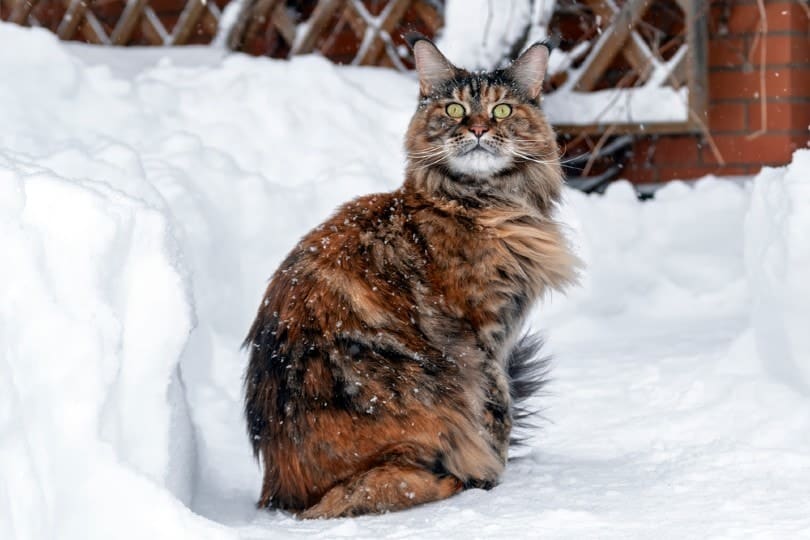
Ideal Diet for Maintaining a Healthy Weight
Your cat needs to be fed high-quality food with plenty of beneficial nutrients to help them stay healthy and strong. The best food to offer your Maine Coon is high-quality commercial dry or wet food. Feeding your cat food with cheap fillers only causes them to gain extra weight.
Along with protein, which is essential for building muscle and providing your cat with the necessary energy, they will also need carbohydrates, fatty acids, amino acids, and vitamins and minerals. All cat food is specifically designed to provide all the necessary nutrients for your cat, while some brands produce food tailored explicitly to Maine Coons and their large bodies.
These cats have the same basic food requirements as all other breeds, but considering the amount of food they need daily, you may need to spend more money than an average cat owner.
Their food should include plenty of protein in an amount that is adequate for their age or size. It is best to consult your veterinarian for more advice and to create a meal plan specifically tailored to your Maine Coon cat.

Conclusion
After learning what your Maine Coons weight and size should be at various stages, you’ll be able to easily track your cat to make sure you’re doing everything correctly. Proper nutrition is one of the most important factors affecting your cat’s growth. Make sure to feed your Maine Coon cat high-quality food and keep them in excellent physical shape.
These cats need plenty of exercise throughout the day because of their large muscular body, so having enough room to run, jump and play around is vital.
Featured Image Credit: Daniel Zopf, Unsplash

